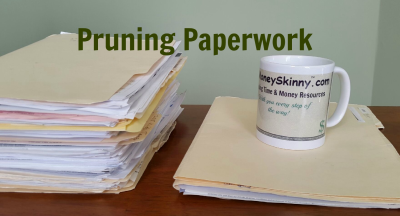7 Essential Tips for IRS Paperwork Retention Periods

In the complex world of tax compliance, understanding how long you need to retain your IRS paperwork is crucial for taxpayers, businesses, and individuals alike. Not only can the proper retention of documents help you resolve any discrepancies with ease, but it also ensures that you're in full compliance with tax laws. Here are 7 essential tips to guide you on IRS paperwork retention periods.
1. Understand IRS Audit Time Limits

The IRS generally has a statute of limitations, typically 3 years from the date you filed your tax return or the due date of the return, whichever is later, during which they can perform an audit. However, under certain circumstances, this can extend to 6 years or even indefinitely:
- If you underreport your income by more than 25%, the IRS can audit you up to 6 years after your return was due.
- If you never file a tax return or if fraud is involved, there is no time limit for an audit.
2. Document Retention for Major Transactions

When it comes to major transactions like real estate purchases, inheritance, or business sales, retaining documents for 7 years or more is often advised. These documents can include:
| Transaction Type | Minimum Retention Period |
|---|---|
| Real Estate Purchase | At least 7 years, longer recommended |
| Inheritance | Forever |
| Business Sale | 7-10 years |

📅 Note: Keep records forever if the transaction impacts your taxable estate, like an inheritance or significant capital gains.
3. Retain Employment Records

Employment tax records, including W-2s, 1099s, and records of employee compensation, should be retained for a minimum of 4 years after the tax due date or the date you paid the tax, whichever is later. Here are key items to retain:
- Payroll records
- Employee tax statements
- Records of fringe benefits
- Retirement and pension records
🏢 Note: Retain records for longer periods if the documents relate to retirement plans, which may be relevant for years to come.
4. The Importance of Year-Round Record Keeping

The most effective way to manage your IRS paperwork is to maintain a year-round record keeping system. Instead of scrambling during tax season, keeping financial documents organized throughout the year can:
- Reduce stress during tax preparation.
- Help you identify potential deductions and credits.
- Ensure you have all the necessary documents for tax filing.
📑 Note: Digital record keeping tools like cloud storage or tax software can help manage and preserve records efficiently.
5. Secure Storage of Sensitive Information

Protecting sensitive tax information is as important as retaining it. Use secure methods for both digital and physical records:
- Encrypt digital records with strong passwords.
- Use secure cloud storage solutions with high-level encryption.
- For physical documents, consider a safe deposit box or a locked filing cabinet in a secure location.
🔒 Note: Always shred or securely dispose of documents containing personal information when no longer needed.
6. Know When to Let Go

While retaining documents is important, not all records need to be kept indefinitely. Understand when it’s safe to dispose of old tax paperwork:
- 3-4 years: Most supporting documents for returns with no unusual transactions.
- Indefinitely: Documents relating to significant events like inheritance, retirement plans, or business formation.
♻️ Note: Regularly review and purge old records while maintaining compliance with IRS retention periods.
7. Special Circumstances

Keep in mind that there are special circumstances where additional record-keeping might be necessary:
- Depreciation: Retain records relating to depreciation until the property is disposed of and the capital gain or loss is reported.
- Litigation: If involved in any tax-related litigation, retain all pertinent records indefinitely.
- Disaster Situations: Be prepared to provide the IRS with documents for disaster relief or tax extension requests.
🔎 Note: Always consult with a tax advisor if you’re unsure about retaining or disposing of specific records.
In summary, the key to IRS paperwork retention is understanding the time limits for audits, the significance of major transactions, and keeping records securely and systematically. By adhering to these tips, you not only ensure compliance with tax laws but also protect yourself in case of an audit or legal scrutiny. The approach to document retention should be proactive, ensuring that you maintain a clear and organized record throughout the year, and know when to dispose of outdated information safely.
Why is it important to keep IRS paperwork?

+
Retaining IRS paperwork is essential for several reasons: to verify the accuracy of your tax returns, to provide proof in case of an audit, to maintain financial history for future reference, and to comply with legal and IRS regulations.
How long should I keep tax returns?

+
Tax returns and related documents should be kept for at least 3 years from the date you filed your return or the due date of the return, whichever is later. However, in cases of significant transactions or potential fraud, you might need to keep them indefinitely.
Can I store my tax records digitally?

+
Yes, digital storage is acceptable for IRS purposes as long as the records are stored securely with proper encryption and you can produce paper copies if requested. It’s important to back up your digital records to prevent data loss.
What if I lose my tax records?

+
If you lose your tax records, you can request copies from your employer, financial institutions, or the IRS. For IRS transcripts, you can order them online, by phone, or by mail. Always ensure to keep a backup of important documents.



